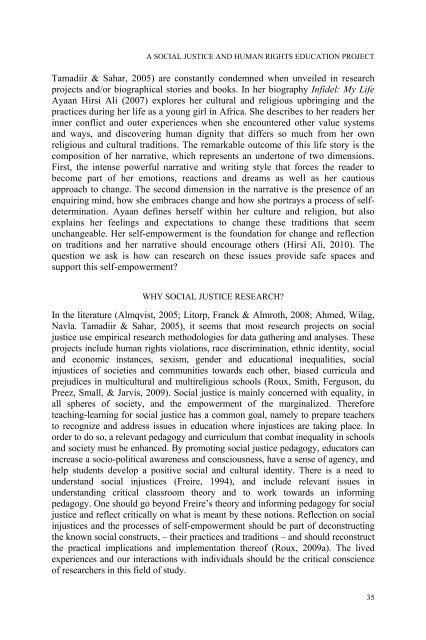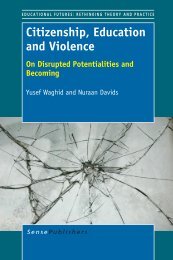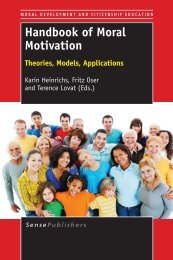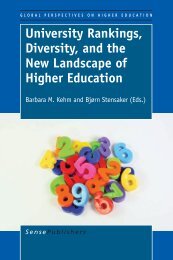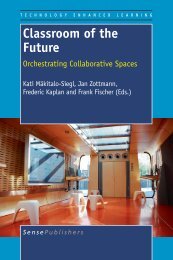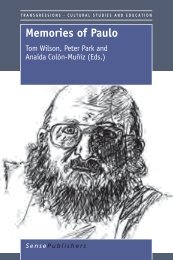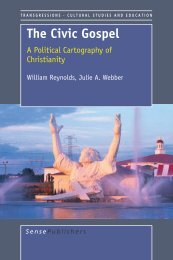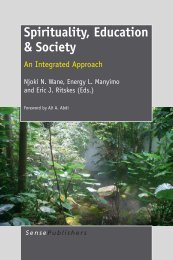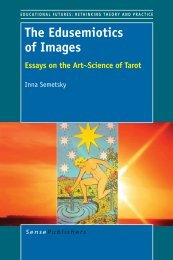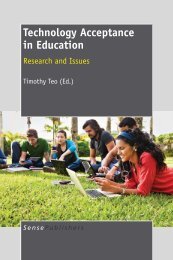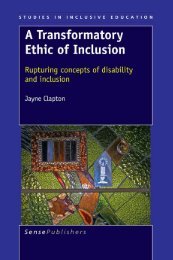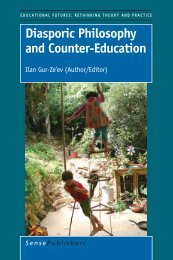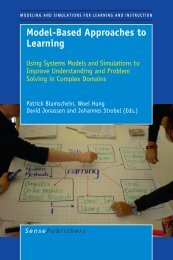Safe Spaces Human Rights Education in Diverse Contexts
Safe Spaces Human Rights Education in Diverse Contexts
Safe Spaces Human Rights Education in Diverse Contexts
You also want an ePaper? Increase the reach of your titles
YUMPU automatically turns print PDFs into web optimized ePapers that Google loves.
A SOCIAL JUSTICE AND HUMAN RIGHTS EDUCATION PROJECT<br />
Tamadiir & Sahar, 2005) are constantly condemned when unveiled <strong>in</strong> research<br />
projects and/or biographical stories and books. In her biography Infidel: My Life<br />
Ayaan Hirsi Ali (2007) explores her cultural and religious upbr<strong>in</strong>g<strong>in</strong>g and the<br />
practices dur<strong>in</strong>g her life as a young girl <strong>in</strong> Africa. She describes to her readers her<br />
<strong>in</strong>ner conflict and outer experiences when she encountered other value systems<br />
and ways, and discover<strong>in</strong>g human dignity that differs so much from her own<br />
religious and cultural traditions. The remarkable outcome of this life story is the<br />
composition of her narrative, which represents an undertone of two dimensions.<br />
First, the <strong>in</strong>tense powerful narrative and writ<strong>in</strong>g style that forces the reader to<br />
become part of her emotions, reactions and dreams as well as her cautious<br />
approach to change. The second dimension <strong>in</strong> the narrative is the presence of an<br />
enquir<strong>in</strong>g m<strong>in</strong>d, how she embraces change and how she portrays a process of selfdeterm<strong>in</strong>ation.<br />
Ayaan def<strong>in</strong>es herself with<strong>in</strong> her culture and religion, but also<br />
expla<strong>in</strong>s her feel<strong>in</strong>gs and expectations to change these traditions that seem<br />
unchangeable. Her self-empowerment is the foundation for change and reflection<br />
on traditions and her narrative should encourage others (Hirsi Ali, 2010). The<br />
question we ask is how can research on these issues provide safe spaces and<br />
support this self-empowerment?<br />
WHY SOCIAL JUSTICE RESEARCH?<br />
In the literature (Almqvist, 2005; Litorp, Franck & Almroth, 2008; Ahmed, Wilag,<br />
Navla. Tamadiir & Sahar, 2005), it seems that most research projects on social<br />
justice use empirical research methodologies for data gather<strong>in</strong>g and analyses. These<br />
projects <strong>in</strong>clude human rights violations, race discrim<strong>in</strong>ation, ethnic identity, social<br />
and economic <strong>in</strong>stances, sexism, gender and educational <strong>in</strong>equalities, social<br />
<strong>in</strong>justices of societies and communities towards each other, biased curricula and<br />
prejudices <strong>in</strong> multicultural and multireligious schools (Roux, Smith, Ferguson, du<br />
Preez, Small, & Jarvis, 2009). Social justice is ma<strong>in</strong>ly concerned with equality, <strong>in</strong><br />
all spheres of society, and the empowerment of the marg<strong>in</strong>alized. Therefore<br />
teach<strong>in</strong>g-learn<strong>in</strong>g for social justice has a common goal, namely to prepare teachers<br />
to recognize and address issues <strong>in</strong> education where <strong>in</strong>justices are tak<strong>in</strong>g place. In<br />
order to do so, a relevant pedagogy and curriculum that combat <strong>in</strong>equality <strong>in</strong> schools<br />
and society must be enhanced. By promot<strong>in</strong>g social justice pedagogy, educators can<br />
<strong>in</strong>crease a socio-political awareness and consciousness, have a sense of agency, and<br />
help students develop a positive social and cultural identity. There is a need to<br />
understand social <strong>in</strong>justices (Freire, 1994), and <strong>in</strong>clude relevant issues <strong>in</strong><br />
understand<strong>in</strong>g critical classroom theory and to work towards an <strong>in</strong>form<strong>in</strong>g<br />
pedagogy. One should go beyond Freire’s theory and <strong>in</strong>form<strong>in</strong>g pedagogy for social<br />
justice and reflect critically on what is meant by these notions. Reflection on social<br />
<strong>in</strong>justices and the processes of self-empowerment should be part of deconstruct<strong>in</strong>g<br />
the known social constructs, – their practices and traditions – and should reconstruct<br />
the practical implications and implementation thereof (Roux, 2009a). The lived<br />
experiences and our <strong>in</strong>teractions with <strong>in</strong>dividuals should be the critical conscience<br />
of researchers <strong>in</strong> this field of study.<br />
35


